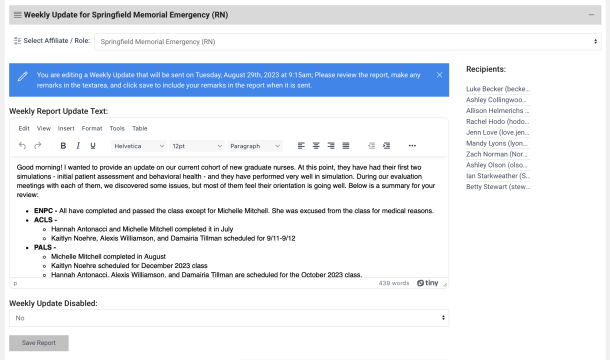Preceptor Rescue
Nursing orientation and preceptorship is a critical phase in developing new graduate nurses. This article explores the concept of "Preceptor Rescue" within the context of a new nurse's preceptor coming to aid and taking over a situation. In contrast, the new nurse is being oriented to the role. While preceptor rescue ensures patient safety, it raises concerns about missed learning opportunities and the factors that lead to such situations. Striking the delicate balance between patient safety and the educational needs of new nurses can feel like walking a tightrope for the preceptor. An orientation program must produce new nurses who can work independently but also help the preceptor's practice evolve. One aspect for educators to consider as they offer career development to preceptors is to provide insights into preventing and managing situations requiring preceptor rescue.
Nursing is a complex and demanding profession that requires a smooth transition from academia to practice. The role of the preceptor is pivotal in helping new nurses bridge this gap, ensuring patient safety, and fostering professional growth. However, in some instances, preceptors may need to intervene or "rescue" a situation when they perceive a risk to patient safety. This practice raises concerns about the lost learning opportunity for the new nurse and the factors that lead to these situations.
Patient Safety vs. Learning Opportunity: A Delicate Balance:
- Patient Safety First: The primary role of healthcare providers is to ensure patient safety. Preceptor rescue is a safeguard to prevent potential harm to patients, which is the utmost priority in healthcare.
- Missed Learning Opportunity: Conversely, preceptor rescue can deprive new nurses of valuable learning experiences. These experiences, often gained through mistakes and challenges, contribute to their professional growth and confidence.
Factors Leading to Preceptor Rescue:
Several factors contribute to situations requiring preceptor rescue:
- Inexperience: New nurses may lack the clinical judgment and skills to handle complex problems.
- Time Pressure: High patient loads and time constraints can lead new nurses to make rushed decisions or overlook critical details.
- Lack of confidence can hinder a new nurse's ability to take charge of a situation, even when they have the necessary knowledge and skills.
- Communication Barriers: Ineffective communication between the preceptor and the new nurse can lead to misunderstandings and mismanagement of patient care.
Preventing and Managing Preceptor Rescue:
- Structured Orientation: Implementing a structured orientation program can gradually help new nurses build confidence and competence. This should include theoretical training, simulation exercises, and supervised clinical experiences.
- Effective Communication: Encourage open and honest communication between preceptors and new nurses. Establishing a safe space for questions and concerns can reduce the likelihood of misunderstandings.
- Feedback and Debriefing: Regular feedback sessions allow new nurses to reflect on their actions, identify areas for improvement, and learn from their experiences.
- Simulation Training: Simulation scenarios can mimic challenging real-life situations, allowing new nurses to practice critical thinking and decision-making in a controlled environment.
- Support Systems: Ensure new nurses have access to mentorship and peer support networks to alleviate feelings of isolation and anxiety.
The concept of "Preceptor Rescue" highlights the complex interplay between patient safety, learning, and the challenges faced by new nurses during their orientation period. While patient safety remains paramount, healthcare institutions must strive to create an environment that supports new nurses in their transition to practice. By identifying the factors leading to preceptor rescue and implementing preventive measures, healthcare organizations can strike a balance between ensuring patient safety and fostering the professional growth of their novice nursing staff. Ultimately, the goal is to empower new nurses to become confident, competent, and capable healthcare providers while maintaining the highest standards of patient care.

Topics
Popular Articles

Measure and Communicate: Return on Investment

Version 1.6 of Orientation Tracking
How can we help?
saving...